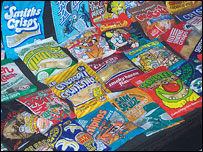The Museum of Brands 品牌博物館
|
 |
| Packaging on display at the Museum of Brands |
Sun Chen: 還有我,孫晨。我們?cè)谶@個(gè)節(jié)目當(dāng)中,會(huì)給你介紹很多倫敦很有意思的地方。我們今天要說(shuō)的主題,就是品牌。
Helen: Brands.
Sun Chen: 還有廣告。
Helen: Advertising.
Sun Chen: 我們今天先遠(yuǎn)離倫敦繁忙的商業(yè)區(qū),我們要去的這家博物館叫做品牌,包裝和廣告博物館。
Helen: The museum's director, Robert Opie, has been collecting brands and packaging for the last 30 years so he was happy to tell us how it all began. As you listen, try to catch the three different types of products that Robert mentions. What does Robert mean by 'in bulk'?
Insert
Well if you go back to say the middle of the 19th century, virtually all the products that were being produced at that time were sent to the grocer in bulk. And he would make up and blend his own specific teas or he would dole out the dried fruits or the sugar or whatever it was. And it would be prepared in front of you and you could see what the product was.
Helen: Up until around 1850, the middle of the 19th century, the products that grocers sold were sent to them 'in bulk'. Did you work out what that means?
Sun Chen: Yes, 我們聽(tīng)到了 Robert 說(shuō)到了三種東西,一個(gè)是茶 tea, 還有干果 dried fruit 和糖 sugar. 這些東西通常都是大量運(yùn)送的,經(jīng)常是裝在大袋子里面。所以單詞 bulk 的意思,就是大量的。
Helen: And at that time, the product would be prepared in front of you. So shoppers could see what they were getting when they paid for a pound in weight of tea, for example.
Sun Chen: 這個(gè)聽(tīng)起來(lái)很好啊,為什么商店現(xiàn)在不這么做了呢?現(xiàn)在所有的東西都已經(jīng)是包裝好的 packaging, 而且事先也都是處理過(guò)的。
Insert
Come the packaging revolution, that all disappeared and why was that? Well, people were getting a bit wary about what the grocer was putting into his tea and so on. He was making up weights of that pound that you ordered with little bits of spurious, hmm, perhaps the sawdust from the floor even!
Helen: Yuck! Sawdust? That's certainly "spurious"; shavings of wood instead of pure tea?
Sun Chen: That's cheating! 沒(méi)想到小賣(mài)部 grocer 為了增加分量,居然把地上的木屑,也加到糖和茶里面,來(lái)增加分量。怪不得人們現(xiàn)在都覺(jué)得小賣(mài)部沒(méi)信譽(yù)了呢!
Helen: It was the dishonest grocer who brought on the packaging revolution. Of course, the people who made the products, the manufacturers.
Sun Chen: 制造商。
Helen: ...soon realised that packaging could mean new publicity opportunities.
Sun Chen: 新的宣傳好機(jī)會(huì)。
Helen: As Robert puts it, "a whole new publicity angle". And customers got a few extras too!
Sun Chen: 我們來(lái)聽(tīng)聽(tīng)下面的兩個(gè)例子。羅伯特跟我們說(shuō)的這個(gè)肥皂的包裝,出現(xiàn)在十九世紀(jì)八十年代。
Insert
Once the manufacturer had control over his product, he could put recipes on, he could say this is the same quality as the time before. So the whole thing took on a whole new meaning and a whole new publicity angle.
I'm looking here at a Sunlight Soap packet, a brand that went right around the world. And the great way that they attracted customers to this was they offered a £1,000 reward if you could find anything wrong with the product. I mean that was a huge enticement.
Helen: Ok, free recipes are quite useful but the soap product wins hands down for me!
Sun Chen: Sunlight 當(dāng)時(shí)的這種肥皂包裝,非常受消費(fèi)者的喜愛(ài)。
Helen: No wonder it was so enticing, tempting people worldwide.
Sun Chen: 這上面說(shuō),你要是發(fā)現(xiàn)產(chǎn)品有問(wèn)題的話,你能得到一千英鎊的獎(jiǎng)勵(lì)。
Helen: After all, a thousand pounds in the 1880s would have been a huge amount of money.
Sun Chen: 現(xiàn)在,一千英鎊也不少啊!
Helen: Of course, branding and packaging is still about selling products but it's also about another sales message that keeps on changing.
Insert
If you buy my brand, you become a hip kinda, cool kinda person. That's the kind of person you want to be. And of course, that'll continually change as our perception and our ideals change, as society changes.
Sun Chen: 這正是銷(xiāo)售廣告的目的。你要是買(mǎi)我們這個(gè)牌子,你就會(huì)變成最時(shí)尚的人。
Helen: And our perception of what's hip and what's cool will change as society changes.
Sun Chen: 隨著社會(huì)和人們認(rèn)知的變遷,廣告也在隨時(shí)改變,來(lái)適應(yīng)人們的口味。
Helen: That's it for today's On the Town from BBC Learning English.
Sun Chen: 我們下次節(jié)目再見(jiàn)。
Helen: Bye bye.
